Brian Irvine at the Library of Congress
By Stephen Brookes • The Washington Post • April 30, 2007
____________________________________________________________________________________
The Brian Irvine Ensemble isn't an orchestra, really. It's more of a traveling explosion -- a kinetic, freewheeling circus where the musicians dance, blow bubbles, cluck at one another like chickens, fall over "drunk" and watch imaginary notes float through the air, all while making some of the most exhilarating and imaginative music you'll ever hope to hear.
 The force behind this engaging madness is Irvine himself, a free-spirited composer from Northern Ireland who brought his 12-man ensemble to the Library of Congress on Friday night. Irvine is a serious musician (he won the British Composer Award last year) but fortunately he hasn't let that cramp his style. His music draws on anything that crosses his ears -- free jazz, punk, the stately icons of the classical repertoire -- and reinvents it all with cheerful abandon. A Dixieland blues will morph into a firestorm of hard bop, then melt into a delicate Satie-esque piano melody while snatches of absurdist dialogue are passed back and forth among the musicians.
The force behind this engaging madness is Irvine himself, a free-spirited composer from Northern Ireland who brought his 12-man ensemble to the Library of Congress on Friday night. Irvine is a serious musician (he won the British Composer Award last year) but fortunately he hasn't let that cramp his style. His music draws on anything that crosses his ears -- free jazz, punk, the stately icons of the classical repertoire -- and reinvents it all with cheerful abandon. A Dixieland blues will morph into a firestorm of hard bop, then melt into a delicate Satie-esque piano melody while snatches of absurdist dialogue are passed back and forth among the musicians.
Anarchic? Not to these ears. The music is tightly written and superbly paced, and it moves like a piece of theater (which it largely is). Tedious clowning? Not at all. Irvine may leap around comically in his ill-fitting suit, conducting with fingers and elbows, and the musicians may be bursting out in smiles the entire time -- but it all comes across as musical play in the highest sense: exuberant, spontaneous and completely alive.
Norah Jones at DAR Constitution Hall
By Stephen Brookes • The Washington Post • April 25, 2007
_________________________________________________________________________
Norah Jones must be perfecting the art of nonchalance. When she casually followed the singer M. Ward onstage at DAR Constitution Hall on Monday night for an opening duet, few people in the audience even seemed to notice. And as she drifted offstage to scattered clapping, Ward felt obliged to point out: "Um -- that was Norah Jones."
And that was pretty much the tone of the whole evening. Jones -- with her backup group, the Handsome Band -- was in fine form, mixing up material from her first two albums with songs from this year's darker, edgier "Not Too Late." But it was a curiously low-key event, from the opening "Come Away With Me" to the heartfelt cover of Tom Waits's "Long Way Home" that closed the show.
Languid is what Jones does, of course; anyone who's heard her 2002 breakout hit "Don't Know Why" is familiar with her mellow, curl-up-by-the-fire style (which won her the unfortunate nickname "Snorah"). That smoky voice could caress anyone into a trance, and in love songs like "Sunrise" and the breezy "Thinking About You," she worked her quiet magic beautifully.
Thankfully, there were a few moments that shattered the placid calm. The bluesy "Sinkin' Soon" showed the whole band at its best, and a smoldering, jungle-jazzy version of "I've Got to See You Again"-- propelled by Adam Levy's demonic guitar -- purely smoked with sex. But the biggest applause of the night came when Jones (playing a toy piano with one hand and her concert grand with the other) sang the political anthem "My Dear Country," whose swipe at George W. Bush ("Who knows -- maybe he's not deranged") won appreciative cheers.
It was hard to hear much of Jones's opening act, the Portland-based singer Ward. Despite a pleasantly beat-up voice, his studiously lo-fi performance was, by the end, drowned out by the chattering of a plainly unimpressed audience.
Contemporary Music Forum at the Corcoran Gallery
Tuesday April 24, 2007
__________________________________________________________________________

CMF director Steve AntoscaThe Washington Post 4/24/07: With its dedication to cutting-edge programming, the Contemporary Music Forum does that most important (if rare) thing in music -- it takes risks. And as often as not, as Sunday's concert at the Corcoran Gallery showed, those risks pay off, exposing fine and thought-provoking new works by little-known composers.
Self-described "timbral explorer" Judith Shatin takes an evident delight in the textural possibilities of sound, and her "Secret Ground" played freely with extended techniques for flute, clarinet, cello and violin. But Shatin never used effects for their own sake. This was highly inventive music on every level: hugely enjoyable and deeply involving, with a constant sense of surprise.
Leon Kirchner's "For Violin Solo" was written as a competition piece, and came off that way -- a cerebral tour de force, played with nonchalant virtuosity and penetrating intelligence by James Stern.
Pianist Jenny Lin
Two video works followed, with mixed results. Steve Antosca's "such a pure force" explores the transition between life and death, and his absorbing score of processed percussion and voice (coupled with imagery of buckyballs, abstracted spermatozoa and sheet music curving through infinite space) created an absorbing meditative effect.
Frederick Weck's "Video VII" fared less well -- colorful blobs set to directionless, chime-heavy music are only so interesting -- but Jeffrey Mumford's solo piano work "a landscape of interior resonances" was a spectacular powerhouse, especially as played by Jenny Lin, one of the most perceptive interpreters of new music around. Different but no less engaging was Laura Schwendinger's "High Wire Act," a charming work inspired by Alexander Calder's circus figures.
Euclid and Degas Quartets at the Library of Congress
Monday April 23, 2007
_______________________________________________________________
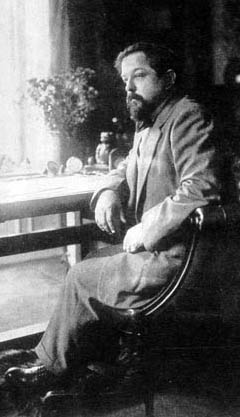
Claude Debussy
The Washington Post 4/23/07: With new string quartets proliferating faster than exit strategies for Iraq, maybe it makes sense to start programming more than one at a time. That’s what the Library of Congress did on Friday, bringing both the Euclid Quartet and the Degas Quartet to Coolidge Auditorium to showcase familiar works and a new octet by the young composer Armando Bayolo.
The Euclids opened the evening with Claude Debussy’s String Quartet in G minor – a work whose strange, elusive beauty that can leave you breathless. The Euclids played it with an elegant mix of passion, ferocity and feathery delicacy, yet their rather astringent sound kept it stubbornly earthbound – well played if not quite, um, Debussy-ish.
They ceded the stage to the Degas Quartet, for Felix Mendelssohn’s String Quartet in E Flat Major Op. 12. The dew was still fresh on Mendelssohn when (at 19) he wrote the piece, but you’d never know it – this is a spectacularly accomplished work, overflowing with wonders and various small miracles. The Degas got off to a rough start, making a soggy muddle of the first movement, but they recovered and turned in a solid if rather timid account of the rest. Cut them some slack, though: both violinists were recently replaced, and the new lineup hasn’t had a chance to gel yet.
Both groups took the stage for Bayolo’s “Ludi” (“Games”), which pits two string quartets against each other for musical games of love, trust and violence. It’s an ambitious work that references everything from mosh pits to Cage-ian indeterminacy, but it came across as resolutely academic, with little engaging sense of play at all – the “Mating Ritual” movement was so somber and sexless it could put you off romance forever. All was forgiven, though, in the beautiful “Benediction”, which tied the proceedings up with a radiant, ethereal bow.
Belohlavek keeps NSO in Czech
Saturday April 21, 2007
____________________________________________________________
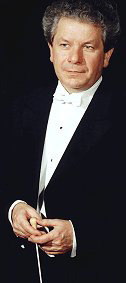
The Washington Post 4/21/07: Czech music isn't in especially short supply around town. Janacek and Martinu show up regularly to add a dash of Mitteleuropean spice to the menu, and Dvorak's "New World" Symphony seems to romp exuberantly through town a couple of times a year. But it was a rare pleasure on Thursday to hear nearly an entire evening devoted to Czech music performed by none less than Jiri Belohlavek -- the preeminent Czech conductor of his generation -- leading the National Symphony Orchestra, with the gifted Christian Tetzlaff on violin.
Belohlavek, who's headed the Prague Symphony, the Czech Philharmonic and the Prague Philharmonia, has been an imaginative promoter of Czech music for decades, dishing up chestnuts like Smetana's "Ma Vlast" when necessary, but often unearthing less familiar works that warrant more attention.
Tetzlaff, a German violinist, plays with stern, merciless intelligence, considerable amounts of which he brought to Mozart's Violin Concerto No. 3 in G, K. 216. Though the work was written when the composer was still a teenager, there is no doubting its maturity; it is challenging music on every level, and Tetzlaff turned in a deeply considered reading that never flagged for a moment. It's hard to be too critical; Tetzlaff's sound is so warm and golden that it makes your ears glow, and the lyrical Adagio sang with rare beauty.
But the concluding Rondo, with its astonishing, near-magical mix of pathos and playful humor, fell disappointingly flat -- an unsmiling account that was easy to admire but hard to love.
The Shakespeare connection returned again after intermission, this time in Smetana's symphonic poem "Richard III." If you've never heard it, lucky you: ungainly, lead-footed and thoroughly unlikable, it's 13 minutes of tedious bombast -- roughly comparable to being banged in the head with frying pans, but without the redeeming esthetic value.
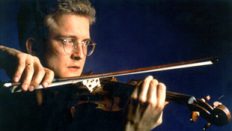 Fortunately Tetzlaff stepped back into the fray to play Leos Janacek's Concerto for Violin and Orchestra. Known as "The Wandering of a Little Soul," it's a bit of an orphan; Janacek started to sketch it out in the mid-1920s but ended up incorporating the music into his opera "From the House of the Dead," where it remained for decades.
Fortunately Tetzlaff stepped back into the fray to play Leos Janacek's Concerto for Violin and Orchestra. Known as "The Wandering of a Little Soul," it's a bit of an orphan; Janacek started to sketch it out in the mid-1920s but ended up incorporating the music into his opera "From the House of the Dead," where it remained for decades.But in the late 1980s, the composers Leos Faltus and Milos Stedron disinterred the original music and rebuilt it as a one-movement symphonic poem. And to judge by Tetzlaff's high-voltage performance, it's a brilliant addition to the Janacek catalogue. From the gripping, military violin-and-drums opening to the slashing, searing final notes, Tetzlaff played with a fiery intensity so impassioned and insightful that it left the audience stunned for several moments -- before breaking into wild applause.
Belohlavek brought Smetana back to close out the evening, in a deeply satisfying account of "The Moldau" -- the second (and probably most loved) of the six symphonic poems that make up "Ma Vlast." Belohlavek's conducting had been impressive all evening, with a superb command of the orchestral palette and an incisive sense of phrasing, but this was a "Moldau" to remember: soaring, transcendent and as lovingly evocative of the Czech landscape as anything ever written.
Metheny and Mehldau at the Warner Theater
Sunday April 15, 2007
_____________________________________________________________
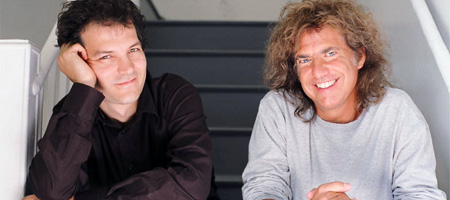
Brad Mehldau (l) and Pat Metheny
The Washington Post 4/14/07: Guitarist Pat Metheny may have one of the most fertile imaginations in jazz. Since exploding on the scene three decades ago, he's leapt fearlessly into everything from hard bop to free jazz, testing the edges with originality and jaw-dropping virtuosity. So when Metheny joined the equally brilliant pianist Brad Mehldau last year for a series of landmark recordings, it was instantly dubbed a "dream team" -- a collaboration to rival that of the legendary Jim Hall and Bill Evans.
And at the Warner Theatre on Thursday, the two put on a show that justified the hype. Ranging from quiet duets and delicate solos to hard-driving quartet playing (with Larry Grenadier on bass and Jeff Ballard on drums), Metheny and Mehldau displayed distinct -- even contrasting -- personalities, but also a rapport so tight it verged on telepathic. The playing was electric, the synergy undeniable.
Metheny is, above all else, a profoundly lyrical musician. There's a kind of open-hearted exuberance to his playing, and an intense fascination with sound itself. Armed with a small arsenal of guitars -- including the custom-made Pikasso (a cubist-looking thing with four necks, two sound holes and 42 strings) -- Metheny painted wildly colorful solos, from the gently-nuanced "Annie's Bittersweet Cake" to a scorched-earth rendition of "Ring of Life."
Mehldau's playing, by contrast, is darker and more introspective. If Metheny provided the luminous skin of the music, then Mehldau exposed its complex heart. He's a superb accompanist -- his imaginative chord voicings and impeccable timing provided a perfect foil for Metheny's flights of imagination, and he kept the music unfolding with quiet power. But it was in his solos that Mehldau's fierce intelligence really came through -- more evidence that he may be the most interesting jazz pianist of his generation.
21st Century Consort: Steinberg's Wit as Music
By Stephen Brookes • The Washington Post • April 9, 2007
_________________________________________________________________________________
Saul Steinberg may be one of the wittiest artists of the 20th Century. His illustrations and collages – currently in a don’t-miss show at the Smithsonian American Art Museum -- are full of sly, satirical humor, sketched out with a few pen strokes and quick dabs of watercolor. There’s nothing epic about them; their power comes from their deft and tender probing of our human foibles. Transformed to music, they wouldn’t be symphonies – they’d be chamber music.
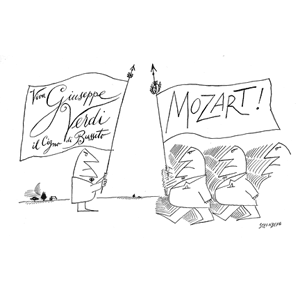
Saul Steinberg / The New YorkerSo it was an inspired move by Christopher Kendall, the director of the 21st Century Consort, to put together a Steinberg-oriented concert at the Museum on Saturday, premiering several works written for the occasion. Virtually all of it was as engaging and inventive as the art itself: David Horne’s sextet “Spike” was a clever, constantly shifting landscape of the imagination, while James Fry’s duo for piano and bass clarinet, “A Little Cartoon Music”, overflowed with Steinbergian puns and playful allusions. “Him and Her” by Washington composer Jessica Krash took two of the artist’s cartoon figures – a forlorn woman in the snow, and a man drawing himself in a single florid swoop of the pen – and joined them together in a mingling of musical souls.
The only out-of-place piece was Claude Bolling’s “Suite for flute and jazz piano trio”, whose pretty banalities, one suspects, would have bored Steinberg senseless. But William Bolcom’s “Second Sonata for violin and piano” got a finely shaded reading from Elisabeth Adkins (with Edward Newman at the piano), and Thomas Albert’s “Illuminations”, for sextet with tap dancer, was absolutely stunning. Though sometimes out of balance -- David Covington’s dancing tended to overpower the music’s delicate textures -- Albert’s music shone with imagination and pure, shimmering beauty; illuminating in every sense of the word.

